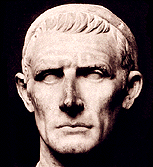Titus Livius Quotes
Temerity is not always successful.
There is nothing worse than being ashamed of parsimony or poverty.
The troubles which have come upon us always seem more serious than those which are only threatening.
The result showed that fortune helps the brave.
Favor and honor sometimes fall more fitly on those who do not desire them.
The name of freedom regained is sweet to hear.
This above all makes history useful and desirable; it unfolds before our eyes a glorious record of exemplary actions.
The populace is like the sea motionless in itself, but stirred by every wind, even the lightest breeze.
There is danger in delay.
He would not anticipate those counsels which are rather bestowed by circumstances on men, than by men on circumstances.
Variant: He would not anticipate events by disclosing his measures, for, after all, circumstances determined measures for men much more than men made circumstances subservient to measures.
Passions are generally roused from great conflict.
Before anything else [Numa] decided that he must instill in his subjects the fear of the gods, this being the most effective measure with an ignorant, and at that time uncultured, people.
Variant: Before anything else, he strove to inculcate in their minds the fear of the gods, regarding this as the most powerful influence which could act upon an uncivilised and, in those ages, a barbarous people.
There is always more spirit in attack than in defence.
In difficult and desperate cases, the boldest counsels are the safest.
A fraudulent intent, however carefully concealed at the outset, will generally, in the end, betray itself.
The state is suffering from two opposite vices, avarice and luxury; two plagues which, in the past, have been the ruin of every great empire.
Greater is our terror of the unknown.
We can endure neither our vices nor the remedies for them.
Variant: We can bear neither our diseases nor their remedies.
Truth, they say, is but too often in difficulties, but is never finally suppressed.
Variant: It is said that truth is far too often eclipsed but never totally extinguished.
Toil and pleasure, dissimilar in nature, are nevertheless united by a certain natural bond.
Better late than never.
Men are only clever at shifting blame from their own shoulders to those of others.
The most honorable, as well as the safest course, is to rely entirely upon
valour.
Fortune blinds men when she does not wish them to withstand the violence of her onslaughts.
I approach these questions unwillingly, as it wounds, but no cure can be effected without touching upon and handling them.
No law is sufficiently convenient to all.
Envy like fire always makes for the highest points.
There is nothing that is more often clothed in an attractive garb than a false creed.
The sun has not yet set for all time.
It is easier to criticize than to correct our past errors.
Variant: It is easier to regret the past than to repair it.
Many difficulties which nature throws in our way, may be smoothed away by the exercise of intelligence.
He will have true glory who despises it.
Variant: The man who scorns false glory will possess the true.
Woe to the conquered!
Variant: Woe to the vanquished!
He is truly a man who will not permit himself to be unduly elated when fortune’s breeze is favorable, or cast down when it is adverse.
There is an old saying which, from its truth, has become proverbial, that friendships should be immortal, enmities mortal.
Seldom are good fortune and good sense granted to men at the same time.
Variant:
Good fortune and a good disposition are rarely given to the same man.
It is easy at any moment to surrender a large fortune; to build one up is a difficult and an arduous task.
Men are slower to recognize blessings than misfortunes.
There is nothing man will not attempt when great enterprises hold out the promise of great rewards.
Under the influence of fear, which always leads men to take a pessimistic view of things, they magnified their enemies' resources, and minimized their own.
There are laws for peace as well as war.
Shared danger is the strongest of bonds; it will keep men united in spite of mutual dislike and suspicion.
Do not expose so many years' good fortune to the hazard of a single hour.
Those ills are easiest to bear with which we are most familiar.
No crime can ever be defended on rational grounds.
Many things complicated by nature are restored by reason.
Law is a thing which is insensible, and inexorable, more beneficial and more profitious to the weak than to the strong; it admits of no mitigation nor pardon, once you have overstepped its limits.
It is when fortune is the most propitious that she is least to be trusted.
Rome has grown since its humble beginnings that it is now overwhelmed by its own greatness.
The greater a man's good fortune the less ought he to count upon it.
From abundance springs satiety.
All things will be clear and distinct to the man who does not hurry; haste is blind and improvident.
Variant: The man who is not in a hurry will always see his way clearly; haste blunders on blindly.
The old Romans all wished to have a king over them because they had not yet tasted the sweetness of freedom.
Variant: The ancient Romans could ill brook a foreign king; but amidst this diversity of political views, all were for a monarchy; they had not yet tasted the sweets of liberty.

